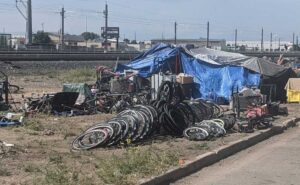In a suburb of Tacoma, Washington, homeless people took over a privately owned vacant lot across the street from a public park. They had no right to be there, and the owners didn’t want them there, but that’s the least of what was wrong with that encampment.
Until it was cleared out by sheriff’s deputies, accompanied by social workers, on the weekend of September 11-12, 2022, “Officers had been called to the camp … numerous times for incidents such as shootings, assaults, stolen vehicles and overdoses,” a Seattle TV station reported here. The sheriff’s department said, “People who lived there were also suspected to be responsible for many thefts from nearby homes and businesses.”
In August 2022, a woman who works in the area contacted another Seattle TV station to complain about the camp. She “did not want her name identified out of fear for her safety, but said she … has called 911 several times to report drug use, overdoses and theft.” (See story here.) That story noted many of the camp residents, when evicted from previous sites, had rejected “services or help.” When the deputies moved in, 8 of the 60 people living there were taken to jail on outstanding warrants.
In July 2022, a Minneapolis electrician had his trailer and $20,000 of tools stolen. His tracking device led to a homeless camp on city property, but police warned him not to go there, because it was “too dangerous.” Even cops had been attacked there. (See story here.) In July 2021, a Seattle couple who went to a homeless camp to retrieve items stolen from their car were attacked with rocks, a pole, and a machete. While escaping in their car, they ran over and killed a homeless man. (See story here.)
There are countless other stories like these from around the country. Some homeless campo residents may be peaceful down-and-outers, but not all of them are. The camps are also populated by drug users and criminals, and citizens are fed up with the problems they bring into their neighborhoods.
But these stories are anecdotal. A University of Miami researcher crunched data from Seattle and found “zero” correlation between homeless camps and increased crime (see story here). The homeless have to be somewhere, and he argues, “These people need services, just like someone who’s sick and needs to go to the doctor and you have the doctor say, ‘Okay, here’s why you’re sick and here’s what you need to do.’ The key is doing that first.”
Offering them housing and services isn’t a solution when they won’t accept it and choose to remain on the streets. So what do you with them? Increasingly, a fed-up public is losing compassion for those who won’t help themselves, and turning to law enforcement for solutions. As that story notes, “as public opinion sours, the pressure is mounting on … city governments, which must decide how long to keep offering those services and tolerating the camps before laying down the law.”
In Parkland, the time was up for that location. The 54 campers who weren’t arrested will go somewhere else, where the cycle will repeat itself again.
Photo below: Stolen bicycles in a Denver homeless camp
